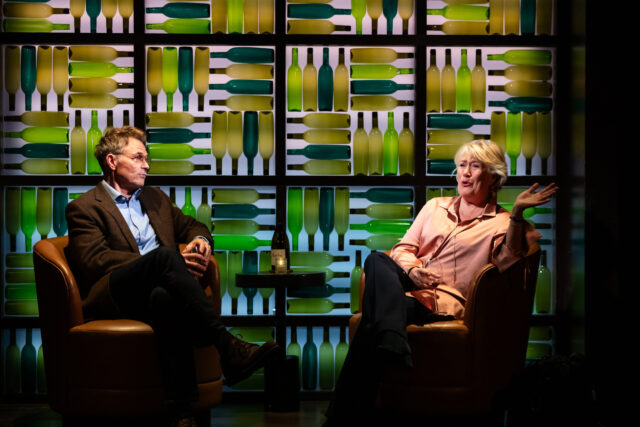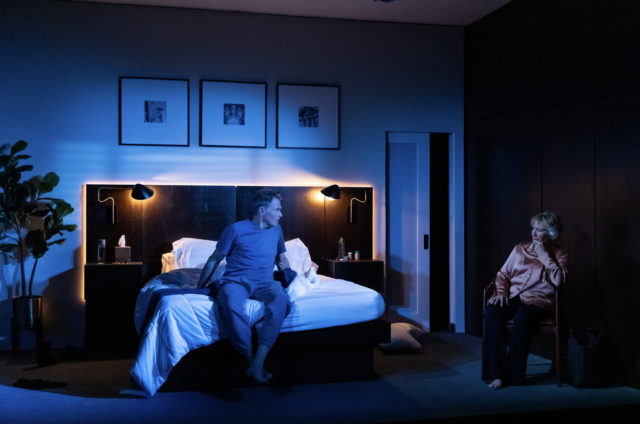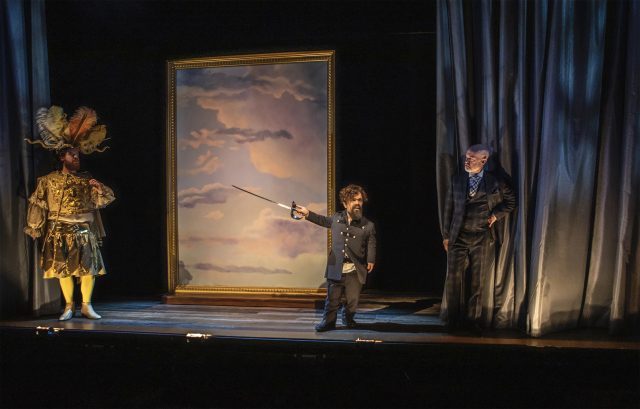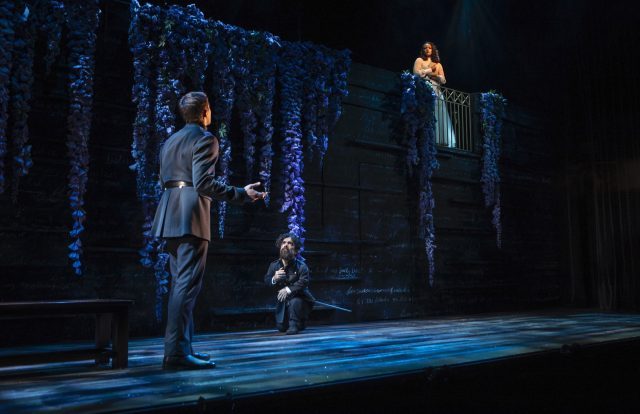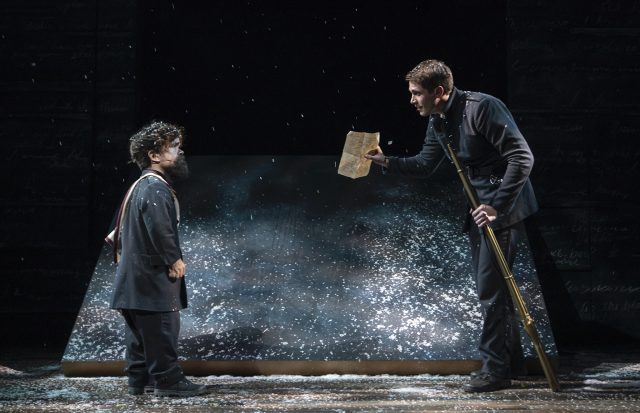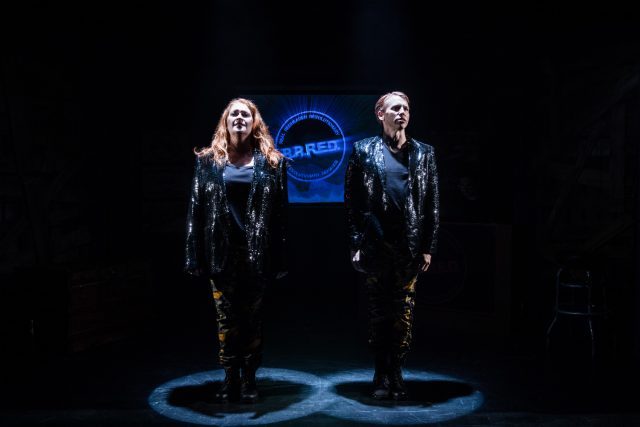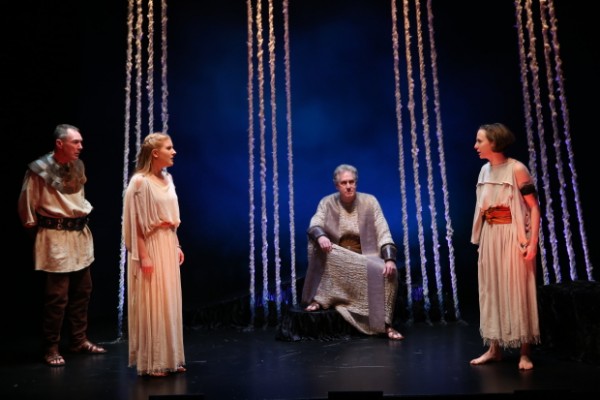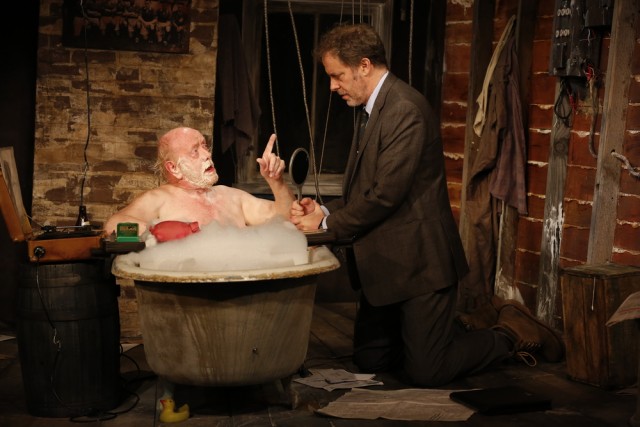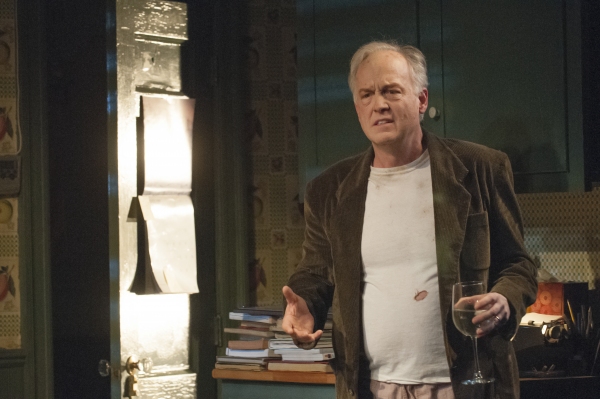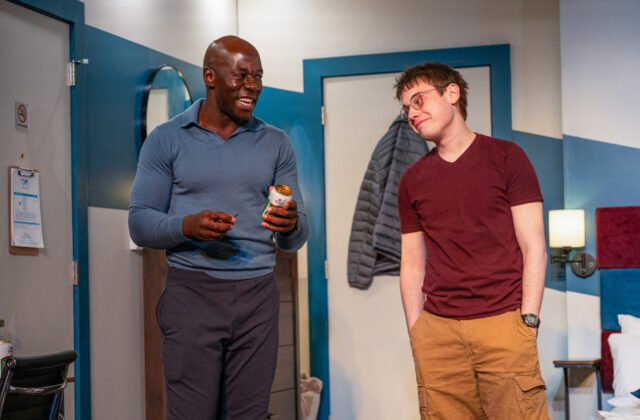
Teddy (McKinley Belcher III) and Jeremy (Uly Schlesinger) spend a difficult night together in A Guide for the Homesick (photo by Russ Rowland)
A GUIDE FOR THE HOMESICK
DR2 Theatre
103 East Fifteenth St. at 20 Union Sq. East
Tuesday – Sunday through February 2, $49 – $129
www.aguideforthehomesick.com
Flight delays and cancellations are unpleasant ways to start or end a trip, putting a sour taste in your mouth. Perhaps that’s part of the reason why a recent Saturday-night performance of Ken Urban’s A Guide for the Homesick, following a half-hour technical delay, felt so distant.
As audience members arrived at the DR2 Theatre, an usher advised them of a hold-up that should only be a few minutes. It was standing-room-only in the lobby as people checked their phones, got a drink in the lounge, and looked uncomfortable, much like waiting for crucial information in an airport that is coming in only bits and pieces. Everyone was relieved when at last the doors opened and the actors took the stage, but the drama about two men having trouble returning home never really took off.
It’s January 2011, and Teddy (McKinley Belcher III) has invited Jeremy (Uly Schlesinger) up to his hotel room near the Amsterdam Airport Schiphol on a rainy night. They had just met in the bar; Teddy, a bold and beautiful thirtysomething Black man, and Jeremy, a squirrelly twentysomething white guy, are drinking beers. Slowly — very, very slowly — we learn that Teddy, who was born and raised in Roxbury and now lives in New York City, has been traveling with his best friend and finance colleague, Eddie, who is about to get married to Margo, but Eddie has disappeared. Jeremy, a Harvard grad, explains that he has missed his flight back to Boston and does not have his luggage or a room.
Teddy is clearly concerned about Eddie, but he refuses to answer any of Margo’s constant calls, assuming it might be bad news. Jeremy had been volunteering at a health clinic outside Kampala in Uganda but had to cut his time short because of an event that haunts him, which he is unwilling to discuss out of shame and embarrassment. Jeremy keeps heading for the door, but Teddy insists he stay; when Teddy moves close to him, Jeremy freaks out, terrified that Teddy is making a move on him.
Soon the narrative alternates between the immediate past and the present, as Belcher portrays Teddy and Nicholas, an HIV+ patient in Uganda who Jeremy is trying to help, and Schlesinger shifts between Jeremy and Eddie as each man’s story eventually comes out.
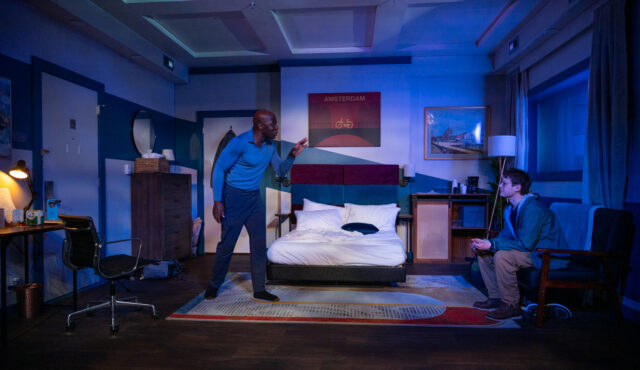
Teddy (McKinley Belcher III) and Jeremy (Uly Schlesinger) go at it in New York premiere of Ken Urban play (photo by Russ Rowland)
Urban (Nibbler, Sense of an Ending) was initially inspired by a commission to write a play about human rights workers, and he decided to focus in part on the violent homophobia in Uganda, which has attempted to pass a number of Anti-Homosexuality laws since 2009. Some countries, such as the Netherlands, have stopped aid as a result, and Urban doesn’t shy away from the involvement of the United States.
“These so-called men of G-d from your country, they keep visiting, and they turn my congregation into this,” Nicholas tells Jeremy, referring to a pair of American pastors who spoke out against “the plague of homosexuals” at his church.
Jeremy replies, “This is a former English colony; there’s always been rules about homosexuality,” to which Nicholas answers, “Long ago, we were invaded by the British. But these days, there is a new invasion. This time from America. I do not recognize my friends, my own family, when they say things like I heard yesterday.” Jeremy assures him, “Look. People say stupid things. But I promise you it’s just a tipping point before change comes. It’s the way it always happens. Things look bad, churches get up in arms, then they lose, and good wins out.”
This past April, Uganda’s Constitutional Court upheld the 2023 Anti-Homosexuality Act, which Human Rights Watch declared “further entrenches discrimination against lesbian, gay, bisexual, and transgender (LGBT) people, and makes them prone to more violence.” Good doesn’t always win out, and Jeremy’s touching and very American belief that tolerance will prevail feels like naivete these days.
Lawrence Moten III’s hotel-room set is appropriately claustrophobic, while Daniel Kluger’s sound features harsh rains that keep Teddy and Jeremy indoors, as well as the din of airplanes taking off and landing, emphasizing the two protagonists’ fears of getting on board and flying home.
Unfortunately, the play, directed by Shira Milikowsky (The Lily’s Revenge, BrideWidowHag), drags out revealing the various secrets and plot twists, making eighty minutes feel much longer. It was hard not to scream out to Teddy and Jeremy to just say what they needed to say already and answer the damn phone. Belcher III (A Soldier’s Play, The Light), who originated the roles of Teddy/Nicholas in 2017 at the Huntington Theatre Company’s Calderwood Pavilion, in a production helmed by Colman Domingo, has a firm grasp on his parts and imbues them with a tender vulnerability. Schlesinger (This Beautiful Future, The Animal Kingdom) is so whiny as Jeremy and manic as Eddie that you just want to grab him and make him cut it out.
There are some intense, riveting moments in A Guide for the Homesick, but too much of the story is artificially manufactured in getting to the point, one that ultimately feels out of date, whether the show is delayed or not.
[Mark Rifkin is a Brooklyn-born, Manhattan-based writer and editor; you can follow him on Substack here.]
